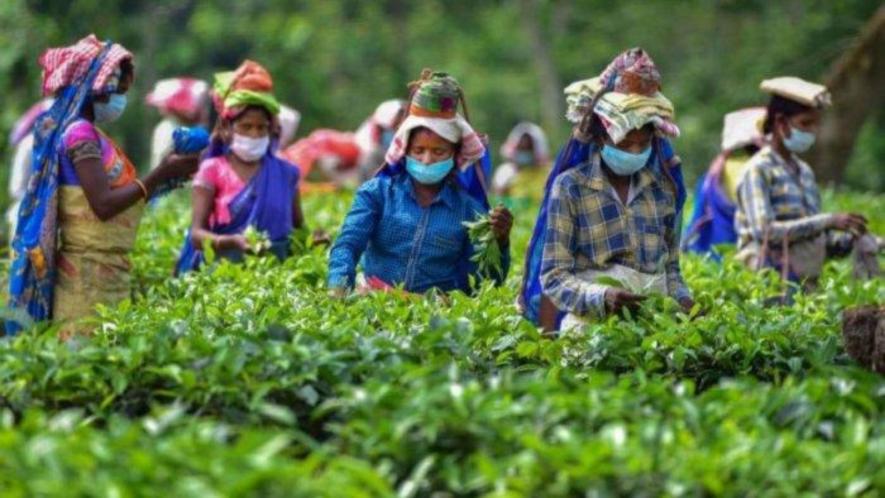WB: Closure of 13 Tea Estates in the Hills and Dooars Region Troubles Tea Workers Ahead of Durga Puja

Representational Image. Image Courtesy: PTI
Kolkata: Prafulla Lakra, a tea worker employed in a tea garden in the Dooars region, also serves as the Regional Secretary of the Jalpaiguri Sadar Cha Bagan Mazdoor Union. In a conversation with NewsClick, he expressed his concerns regarding the deceptive tactics employed by the owners to fabricate crises and subsequently shutter the gardens.
This trend is causing alarm in both the hills and the Dooars region. Prafulla Lakra stated, "We toil tirelessly throughout the year, completing our assigned tasks, and during the autumn festival, we eagerly anticipate the bonus announcement. However, the unscrupulous actions of the owners have greatly infuriated the workers. The decision of these rogue owners has impacted over 10,000 workers, with recent closures, such as Silo Tea Garden and New Silo Tea Garden in Dooars, affecting more than 2,000 tea workers."
NewsClick interviewed Saman Pathak, former MP and President of Chia Kaman Mazdoor Union, as well as the leader of the Joint Forum of Tea Workers. Pathak conveyed that this year, tea garden owners are resorting to unfair tactics out of fear that they will have to provide the agreed-upon 19% bonus, as per the Planters organisations' agreement.
In the hills, Munda Tea Estate, Rumbook Tea Estate, Cedar Tea Estate, Peshok Tea Estate, Nagari Tea Estate, Pandam Tea Estate, Chungthung Tea Estate, Samarikpani/Tungsung Tea Estate, and Panighata Tea Estate have been closed by the owners, resulting in the absence of bonus payments this year. Tea workers in the hills and the Dooars region consistently produce high-quality tea and meet their assigned tasks promptly. However, when it comes to bonuses, they feel marginalised. Pathak stated, "This season, being a dry period for leaf plucking, only pruning activities take place. It is most unfortunate that the owners, who profit from year-long operations, choose this time to close the tea garden when they should be paying bonuses to the tea workers." He further added that the Bharatiya Janta Party (BJP) MPs and MLAs in the area do not heed the cries of the tea workers, just as the Trinamool Congress (TMC)-state government does not.
On the morning of Mahalaya, the Chamurchi Tea Garden was closed. Chamurchi, which employs more than 1,000 workers, is a significant tea garden in the Dooars.
Speaking to reporters, Zia ul Alam, a prominent leader of the Joint Forum of Tea Workers, expressed disappointment in the government's lack of proactive involvement in bonus negotiations. He noted that the owners, taking advantage of this situation, are providing inadequate compensation to tea workers instead of their rightful bonuses. The struggle to reclaim these rights has begun in the northern regions of the state. Alam emphasised that a class struggle between workers and owners has commenced in the Dooars region and the hills.
The tea plantations in the region span 97,280 hectares (240,400 acres) and produce 226 million kg of tea, accounting for approximately a quarter of India's total tea production. The Dooars region houses 154 gardens out of the 283 tea gardens in North Bengal, employing 3.5 lakh workers.
The cultivation of tea in the Dooars was primarily introduced and promoted by the British, but Indian entrepreneurs made significant contributions. Goodricke owns and operates 12 tea gardens in the Dooars, while the Duncan Company operates approximately 10 tea gardens.
In the Darjeeling district, where there is potential for 11 million kg of tea production, the current production stands at 6.5 million kg due to the departure of most male workers to work as migrants in other states. Women now make up over 80% of the tea workforce.
Prafulla Lakra, who works as a voucher worker and night guard in the Denguajhar Tea Estate, emphasised the challenging tasks assigned to tea workers during the plucking season, with penalties imposed for incomplete tasks. He pointed out that the tea workers anticipate bonuses throughout the year and that they should be based on the same task ratio.
The new generation of tea workers is increasingly disinterested in the profession and is migrating to other states to work as labourers. Estate laws stipulate that only those employed in the tea garden can reside in the garden area, but families are rarely evicted for not working in the gardens. Tea unions used to support tea workers in disputes with garden management, but the unions have weakened over the past 11 years. The ruling party's tea union has colluded with tea garden owners and failed to support tea garden employees in their times of need.
Get the latest reports & analysis with people's perspective on Protests, movements & deep analytical videos, discussions of the current affairs in your Telegram app. Subscribe to NewsClick's Telegram channel & get Real-Time updates on stories, as they get published on our website.























